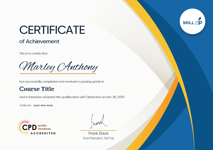Building Information Modelling Processes Simplified: Guide to Streamlining Your Workflow
Special Sale| CPD Accredited| FREE PDF Certificate & Transcript | Lifetime Access| Tutor Support | Free Exam
Skill Up
Summary
- Certificate of completion - Digital certificate - Free
- Certificate of completion - Hard copy certificate - £9.99
- Exam(s) / assessment(s) is included in price
- Tutor is available to students
Add to basket or enquire
Overview
Building Information Modeling is a process that uses digital models to represent the physical and functional aspects of a building. Building Information Modelling is becoming increasingly popular in the architecture, engineering, and construction (AEC) industry due to its many benefits, such as improved communication, collaboration, and efficiency.
This course will teach you the basics of Building Information Modelling and how to use it to streamline your workflow. You will learn about the different aspects of Building Information Modelling, including its history, nature, processes, technologies, and software. You will also learn about the benefits of Building Information Modelling for owners and facility managers and how it is used in design and construction.
Learning Outcomes:
- Understand the fundamentals of Building Information Modelling and its applications in the industry.
- Explore the history and nature of Building Information Modelling to grasp its evolution and significance.
- Gain proficiency in Building Information Modelling processes, from planning to execution.
- Familiarise yourself with the latest Building Information Modelling technologies and software used in the field.
- Discover the benefits of Building Information Modelling for owners and facility managers.
- Explore how Building Information Modelling enhances design and construction workflows.
CPD
Course media
Description
In the dynamic world of architecture and construction, staying ahead of the curve is essential. Our Building Information Modelling Processes Simplified course equips you with the knowledge to optimise your workflow using Building Information Modelling. From the very basics to advanced techniques, this comprehensive course covers all aspects of Building Information Modelling, ensuring you gain a solid foundation in this transformative technology.
We also delve into the benefits of Building Information Modelling for owners and facility managers, showcasing how this technology enhances communication, collaboration, and decision-making throughout the project lifecycle. Discover how Building Information Modelling revolutionises design and construction workflows, enabling better visualisation, clash detection, and project coordination.
Whether you're an architect, engineer, project manager, or construction professional, this course is designed to elevate your skills and expand your career opportunities. Join us on this transformative journey and unlock the potential of Building Information Modelling.
Who is this course for?
- Aspiring sous chefs who want to expand their culinary knowledge and expertise.
- Culinary enthusiasts who wish to explore the diverse cuisines of British, French, and Indian cooking.
- Home cooks and food lovers who want to master traditional recipes and techniques.
- Culinary students seeking a comprehensive understanding of sous chef cooking.
- Individuals interested in the cultural and historical significance of British, French, and Indian cuisines.
Career path
- Sous Chef: £25,000 - £40,000 per year
- Catering Chef: £20,000 - £35,000 per year
- Menu Developer: £30,000 - £45,000 per year
- Private Chef: £35,000 - £60,000 per year
- Culinary Instructor or Consultant: £25,000 - £50
Questions and answers
Currently there are no Q&As for this course. Be the first to ask a question.
Certificates
Certificate of completion - Digital certificate
Digital certificate - Included
Certificate of completion - Hard copy certificate
Hard copy certificate - £9.99
Inside the UK student have to pay an additional delivery fee of £10, whereas International students are required to pay an additional fee of £19.99 to receive a hard copy of the certificate delivered to their address.
Reviews
Currently there are no reviews for this course. Be the first to leave a review.
Legal information
This course is advertised on reed.co.uk by the Course Provider, whose terms and conditions apply. Purchases are made directly from the Course Provider, and as such, content and materials are supplied by the Course Provider directly. Reed is acting as agent and not reseller in relation to this course. Reed's only responsibility is to facilitate your payment for the course. It is your responsibility to review and agree to the Course Provider's terms and conditions and satisfy yourself as to the suitability of the course you intend to purchase. Reed will not have any responsibility for the content of the course and/or associated materials.



